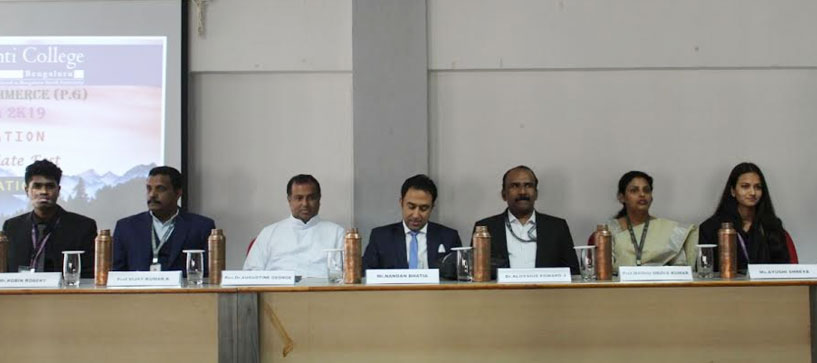
Best Practcies
Title of the Practice:
• Peer Research Group (PRG)
Objectives of the Practice:
• To inculcate and enhance the research culture among the post graduate students.
• To enable the student to realize the importance of research in the field of commerce.
The Context:
Students in post graduate level are required to have teaching capabilities and skills for their professional career in the field of teaching. Hence there must be an adequate encouragement for teaching activities at post graduate level at the early stage of their post graduate studies. So that students could take up teaching assignments at under graduate level with adequate knowledge in the areas of teaching.
Peer tutoring practice is a system of instruction in which learners help each other and learn (themselves) by teaching. It is an instructional system in which students teach other students. It is an approach in which one student instructs another student in material on which the first is an expert and the second is a novice. It occurs when tutor and tutee are at the same age. The tutor might be older than the tutee in cross age tutoring which sometimes this is used to include both types.
When used in teaching-learning situations, to tutor means to coach, teach or instruct another or do so among themselves. Tutor is more knowledgeable, skilled and has the ability to influence others. Group must be close in age, skills and learning styles. There are different types of tutoring such as instructional peer tutoring, monitorial tutoring, pair tutoring, structural peer tutoring
• Instructional Peer Tutoring: Older, brighter students are coaching the young ones. This could be done on the one-to-one or one-to-a group arrangements. They may agree on how the assistance will be provided. This is practiced when there is a big difference between tutor and tutee.
• Monitorial Tutoring: Class is divided into groups of 4 or 5 members. Monitors are assigned to lead each group. The teacher has more time to attend to the rest while tutors monitor and help the rest.
• Pair Tutoring: Children of the same age, one better skilled than the other. Interact and help one another to pursue the learning activity. They can read and discuss together.
• Structural Peer Tutoring: Assistance of trained tutors is required in following instructions or definite procedures that are provided in models and guides.
The Practice:
This best practice was introduced in the academic year 2022-23. The final students of M.Com and M.Com (FA) are encouraged to select the subject topics in the area of commerce and present the topics to their peer members. The peer members are encouraged to give their suggestions, insights and inputs for enhancing their imparting skills. After a tutoring activity, an evaluation of both parties’ performance should be undertaken in order to guide future tutoring events. Tutees receive individualized instruction, as through their own teacher. Immediately, errors are corrected and rewards for good performance are awarded.
Careful selection of tutors afford better interactions that facilitate learning since they are older, skilled and knowledgeable. Values of cooperation, respect for one another and reciprocal attitudes are inculcated. Working in smaller groups with monitors around minimizes discipline problems or indifference to get actively involved. Since tutors are ready to share assistance, they are afforded the motivation to move themselves in intellectual and social traits. Since tutors are a little order and better equipped, tutees feel more secure in their presence be it in a social or academic setting.
Practice of PRG
During this academic year 2022-2023, the following activities are done.
• Step 1: Teachers choose a research model best suited to their students' needs.
• Step 2: Teachers train students to effectively act as peer researcher.
• Step 3: Students support other students in the learning process.
• Step 4: Teachers monitor the peer research process.
Activities of PRG
1) Class-Wide Peer Research Tutoring: The entire class is split into equal groups to work on an assigned task. Students take turns teaching and learning.
2) Peer Assisted Learning: Students are paired with peers of similar abilities for doing research in the areas of their specialization.
3) Specialization Research Group: The students who are specialized in various domains of commerce such as core finance, investment, financial services, digital financial services, tax, banking, accounting are paired together for brainstorming, with the specialized student who has expertise in the particular domain of commerce is acting in the tutor role.
Problems Encountered
• The students lack basic knowledge of research and feel difficulty in understanding the advanced concepts of the subjects while writing a research paper in the domain of commerce.
• The students were found with a lack of exposure in preparing online resources and materials needed for preparing research papers in the domain of commerce.
Resources Required
• Websites, Journals, Magazines and text books
• https://www.bseindia.com/sensex/code/16/
• https://www.nseindia.com/resources/publications-reports-nse-market-pulse
Outcome & Evidence of Success
• 69 Students (30 Students from final year M.Com & 39 Students from final year M.Com FA have taken up research topics on various domains of commerce and business. Total number of research hours taken by the students is 5 hours/week during odd semester.
• Students are able to select the subject topics and titles for their teaching assignments at undergraduate level and the students have confidence and clarity in selecting their areas of subjects for their teaching assignments as part of their curriculum.
• The students could be able use ITC tools for their effective delivery and better understanding of the subject topics.
Title of the Practice:
• Research Colloquium – The Art of Drafting a Research Schema in Functional Areas of Commerce
Objectives of the Practice:
• To enhance artistic skills of writing a research schema in the functional areas of commerce.
• To enable the student to realize the importance of research design in the functional areas of commerce.
The Context:
Students in post graduate level are below the par in research skills required to make a research scheme and design. Hence there must be an adequate encouragement for research activities at post graduate level at the early stage of their post graduate studies. So that students could complete their project report in scheduled time during final year of their studies with adequate knowledge in the areas of research.
The Practice:
During the academic year 2022-23, the students of second semester M.Com and M.Com (FA) are trained under the aegis of research colloquium to frame research schema or research design in the technical areas of commerce and present the research schema during the research colloquium. The students are encouraged to present their research design as part of preliminary stage of the research project to be done in ensuring semester and this preliminary stage of the research schema will be judged by the faculty members of the department in the light of investment, finance, accountancy, taxation, etc.
Activities of Research Colloquium
The students of second semester M.Com and M.Com (FA) will be encouraged to a research schema in the functional areas of commerce.
Problems Encountered & Resources Required
• The students lack basic knowledge and skills of drafting a research schema or research design in the functional areas of commerce and feel difficulty in understanding procedure to frame research methodology.
• The students were found with a deficiency of expertise to go through the reviews and methodology of previous research paper to make a new schema or a new research design.
• Computer Laboratory, SPSS Software & AMOS Software
• Websites, Journals, Magazines and text books
Outcome & Evidence of Success
a) Equip each other by enriching the artistic skills of writing a research schema.
b) Expand interdisciplinary areas where they can apply the developed research schema.
c) Redefining pedagogy through research-based methods
d) Brainstorm domain specific administrative issues through crowd resourcing
e) Solicit innovative ideations from students as human resources.
Title of the Practice:
• Peer Tutoring Group (PTG)
Objectives of the Practice:
• To inculcate and enhance the teaching-learning culture among the post graduate students.
• To enable the student to realize the importance of research in the field of commerce.
The Context:
Students in post graduate level are required to have teaching capabilities and skills for their professional career in the field of teaching. Hence there must be an adequate encouragement for teaching activities at post graduate level at the early stage of their post graduate studies. So that students could take up teaching assignments at under graduate level with adequate knowledge in the areas of teaching.
Peer tutoring practice is a system of instruction in which learners help each other and learn (themselves) by teaching. It is an instructional system in which students teach other students. It is an approach in which one student instructs another student in material on which the first is an expert and the second is a novice. It occurs when tutor and tutee are at the same age. The tutor might be older than the tutee in cross age tutoring which sometimes this is used to include both types.
When used in teaching-learning situations, to tutor means to coach, teach or instruct another or do so among themselves. Tutor is more knowledgeable, skilled and has the ability to influence others. Group must be close in age, skills and learning styles. There are different types of tutoring such as instructional peer tutoring, monitorial tutoring, pair tutoring, structural peer tutoring
• Instructional Peer Tutoring: Older, brighter students are coaching the young ones. This could be done on the one-to-one or one-to-a group arrangements. They may agree on how the assistance will be provided. This is practiced when there is a big difference between tutor and tutee.
• Monitorial Tutoring: Class is divided into groups of 4 or 5 members. Monitors are assigned to lead each group. The teacher has more time to attend to the rest while tutors monitor and help the rest.
• Pair Tutoring: Children of the same age, one better skilled than the other. Interact and help one another to pursue the learning activity. They can read and discuss together.
• Structural Peer Tutoring: Assistance of trained tutors is required in following instructions or definite procedures that are provided in models and guides.
The Practice:
The students of M.Com and M.Com (FA) are encouraged to select the subject topics in the area of commerce and present the topics to their peer members. The peer members are encouraged to give their suggestions, insights and inputs for enhancing their imparting skills. After a tutoring activity, an evaluation of both parties’ performance should be undertaken in order to guide future tutoring events. Tutees receive individualized instruction, as through their own teacher. Immediately, errors are corrected and rewards for good performance are awarded.
Careful selection of tutors afford better interactions that facilitate learning since they are older, skilled and knowledgeable. Values of cooperation, respect for one another and reciprocal attitudes are inculcated. Working in smaller groups with monitors around minimizes discipline problems or indifference to get actively involved. Since tutors are ready to share assistance, they are afforded the motivation to move themselves in intellectual and social traits. Since tutors are a little order and better equipped, tutees feel more secure in their presence be it in a social or academic setting.
Practice of PTG
• Teachers choose a model best suited to their students' needs.
• Teachers train students to effectively act as peer tutors.
• Students support other students in the learning process.
• Teachers monitor the peer tutoring process.
Activities of PTG
1) Class-Wide Peer Tutoring: The entire class is split into equal groups to work on an assigned task. Students take turns teaching and learning.
2) Peer Assisted Learning: Students are paired with peers of similar abilities for structured tasks.
3) Cross-Specialization Peer Tutoring: The students who are specialized in various domains of commerce such as core finance, investment, financial services, digital financial services, tax, banking, accounting are paired together for brainstorming, with the specialized student who has expertise in the particular domain of commerce is acting in the tutor role.
Problems Encountered & Resources Required
• The students may lack basic knowledge of teaching and feel difficulty in understanding the advanced concepts of the subjects.
• The students were found with a lack of exposure in preparing materials needed for teaching aids and audio-visual aids for teaching.
• Websites, Journals, Magazines and text books
Outcome & Evidence of Success
• 7 Students ( 6 Students from IV M.Com & 1 Student from IV M.Com FA have taken up teaching assignments on various domains of commerce at undergraduate level. Total number of teaching hours taken by the students is 5 hours.
• Students are able to select the subject topics and titles for their teaching assignments at undergraduate level and the students have confidence and clarity in selecting their areas of subjects for their teaching assignments as part of their curriculum.
• The students could be able use ITC tools for their effective delivery and better understanding of the subject topics.
No. of Students Who Have Taken Up Teaching Activity
SL. NO |
REG NO |
STUDENT NAME |
CLASS |
1 |
20CM11004 |
ASHA T |
IV M.COM |
2 |
20CM11010 |
INDRA S |
IV M.COM |
3 |
20CM11014 |
KENNETH WILSON B |
IV M.COM |
4 |
20CM11019 |
RACHEL MARINA |
IV M.COM |
5 |
20CM11020 |
RAJESH R |
IV M.COM |
6 |
20CM11032 |
NAGESHWARI S |
IV M.COM |
7 |
20CM201026 |
RITU SINHA |
IV M.COM FA |
Title of the Practice:
Peer Tutoring Group
Objectives of the Practice:
• To inculcate and enhance the teaching-learning culture among the post graduate students.
• To enable the student to realize the importance of research in the field of commerce.
The Context:
Students in post graduate level are required to have teaching capabilities and skills for their professional career in the field of teaching. Hence there must be an adequate encouragement for teaching activities at post graduate level at the early stage of their post graduate studies. So that students could take up teaching assignments at under graduate level with adequate knowledge in the areas of teaching.
Peer tutoring practice is a system of instruction in which learners help each other and learn (themselves) by teaching. It is an instructional system in which students teach other students. It is an approach in which one student instructs another student in material on which the first is an expert and the second is a novice. It occurs when tutor and tutee are at the same age. The tutor might be older than the tutee in cross age tutoring which sometimes this is used to include both types.
When used in teaching-learning situations, to tutor means to coach, teach or instruct another or do so among themselves. Tutor is more knowledgeable, skilled and has the ability to influence others. Group must be close in age, skills and learning styles. There are different types of tutoring such as instructional peer tutoring, monitorial tutoring, pair tutoring, structural peer tutoring
Instructional Peer Tutoring: Older, brighter students are coaching the young ones. This could be done on the one-to-one or one-to-a group arrangements. They may agree on how the assistance will be provided. This is practiced when there is a big difference between tutor and tutee.
Monitorial Tutoring: Class is divided into groups of 4 or 5 members. Monitors are assigned to lead each group. The teacher has more time to attend to the rest while tutors monitor and help the rest.
Pair Tutoring: Children of the same age, one better skilled than the other. Interact and help one another to pursue the learning activity. They can read and discuss together.
Structural Peer Tutoring: Assistance of trained tutors is required in following instructions or definite procedures that are provided in models and guides.
The Practice:
The students of M.Com and M.Com (FA) are encouraged to select the subject topics in the area of commerce and present the topics to their peer members. The peer members are encouraged to give their suggestions, insights and inputs for enhancing their imparting skills. After a tutoring activity, an evaluation of both parties’ performance should be undertaken in order to guide future tutoring events. Tutees receive individualized instruction, as through their own teacher. Immediately, errors are corrected and rewards for good performance are awarded.
Careful selection of tutors afford better interactions that facilitate learning since they are older, skilled and knowledgeable. Values of cooperation, respect for one another and reciprocal attitudes are inculcated. Working in smaller groups with monitors around minimizes discipline problems or indifference to get actively involved. Since tutors are ready to share assistance, they are afforded the motivation to move themselves in intellectual and social traits. Since tutors are a little order and better equipped, tutees feel more secure in their presence be it in a social or academic setting.
Problems Encountered & Resources Required
• The students may lack basic knowledge of teaching and feel difficulty in understanding the advanced concepts of the subjects.
• The students were found with a lack of exposure in preparing materials needed for teaching aids and audio-visual aids for teaching.
• Websites, Journals, Magazines and text books
Outcome & Evidence of Success
• Students are able to select the subject topics and titles for their teaching assignments at undergraduate level and the students have confidence and clarity in selecting their areas of subjects for their teaching assignments as part of their curriculum.
• The students could be able use ITC tools for their effective delivery and better understanding of the subject topics.
Title of the Practice:
• Samshodhan - Research Schema Writing
Objectives the Practice:
• To inculcate the art of writing professional research papers in the area of commerce, finance and business among post graduate studies
• To enable the students to present their research papers in the national and international conferences conducted by various universities and colleges.
The Practice:
The students of Final year and First year M.Com and M.Com (FA) will be encouraged to select topic on paper presentation and publication, with guidance by a teachers and students are encouraged to present their paper internally before presenting externally and any modification required will be made by the students with the guidance of teachers
Problems Encountered & Resources Required
• The students may lack basic knowledge of research and feel difficulty in understanding the SPSS & AMOS Software Package.
• The students were found with a lack of exposure in preparing the research questionnaire with help of Google Form.
• Computer Laboratory, SPSS Software & AMOS Software
• Websites, Journals, Magazines and text books
Outcome & Evidence of Success
The Students of Final year M.Com and M.Com FA have presented 127 research papers at the domain of commerce and business in various national and international conferences conducted by different institutions and universities. The students of department of commerce PG have bagged five best paper awards in the research paper presentation contest conducted by different universities and colleges.
Rural Exposure Programme - Gramasamveditha
Department of Commerce PG organized Two-Day Rural Exposure Programme with a tag line of Gramasamveditha for I Semester M.Com, M.Com FA & M.Com FA with CIMA from 11th to 12th February, 2020 at Kannamangala village, Doddaballapur Taluk, Karnataka.
To inculcate the student fraternity with the core values and a social concern towards our society and to give them a forum to learn from the Rural India, the first year M.Com & M.Com FA students were taken to sensitize the rural village.
In Gramasamveditha, students stayed in a village, observed, learned and conducted various activities and surveys to cognize living standards, cultures, taboos, ecosystem and social and economic issues of rural people. Students interacted with people in the village by way of a formal survey and also through informal activities. Students also conducted an awareness campaign on the various schemes and policies of Central and State Governments as a way to reach out the rural poor through financial inclusion.
Students also conducted various indoor and outdoor games and activities for the village people and school children and motivated them with prizes, mementos and gifts. This Rural Exposure Programme with a tag line of Gramasamveditha acts as an eye opener to the student fraternity in understanding their social responsibility towards wellbeing of the society and the country at large.
Total 98 students had an active participation and involvement in Rural Exposure Programme. The students have sensitized that the Gramasamveditha was a wonderful experience and was an once-in-a-lifetime opportunity to observe and interact with people in a rural area. This Rural Exposure Programme provided an excellent platform for the students to bond with each other and to learn valuable life and social skills as well. Having fun activities with school children was the crux part of the programme agenda as well.
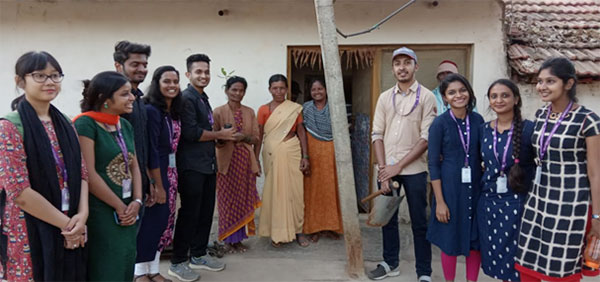
Value Education: Choices We Need to Make in Life Begins at PU Level
Ms. Konyn Tuba Lappay, III Semester M.Com, Department of Commerce PG delivered a lecture on “Value Education: Choices We Need to Make in Life Begins at PU Level” at St. Mary’s P.U College from 10 am to 12 pm on 1st July, 2019.
The main objective of this workshop is to enable P.U students to decide on career opportunities available after 12th and how they can make themselves equipped to this volatile, uncertain, complex and ambiguous world where they don’t have to run for success but in fact strive for excellence and success is guaranteed. She spoke about 5 principles to be excellent in this modern era. There were about 40 students from different streams like commerce, arts and science actively attended the session. The students have said that the session was fruitful and equipped them to flourish in the volatile, uncertain, complex and ambiguous world.
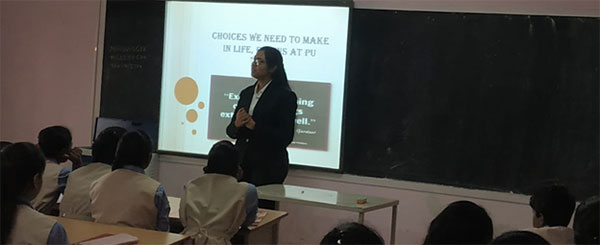
Industrial Tour
Department of Commerce PG organized Three Days Industrial Tour to Hyderabad from 28.09.2019 to 02.10.2019. Total 81 students and 3 faculty members visited various places in Hyderabad. Dr.M.Krishnamoorthi, Ms. A Pushpa & Dr. K.Sivasubramanian were the faculty coordinators who accompanied III M.Com, III M.Com FA & III MA Economics Students for Industrial Tour to Hyderabad. The places visited by our students are Salar Jung Museum, Charminar, Ramoji Film City, Hussain Sagar Lake, Lumbani Park, Birla Mandir etc. The students along with the faculty members have also visited one of the reputed industries J.K Fenner (India) Limited for acquiring practical knowledge and exposures on various functional areas of the Industry. This industrial tour aims to provide the students with a practical real-world perspective on different functions in organizations such as Marketing, HR, Finance, Operations, Customer Service, Logistics, etc.
Learning Outcome:
The students and faculty members had the pleasant, joyful and wonderful experience in the Industrial Tour and it has also provided the students a platform to learn about various functional areas of the business concern and acquire practical exposures on the operations of the Industry. The Industrial Tour helped in creating a better relationship among students and faculties as well. The students were highly delighted with the places visited by them and experienced a great amount of knowledge, cheerfulness and excitements during the Industrial Tour.
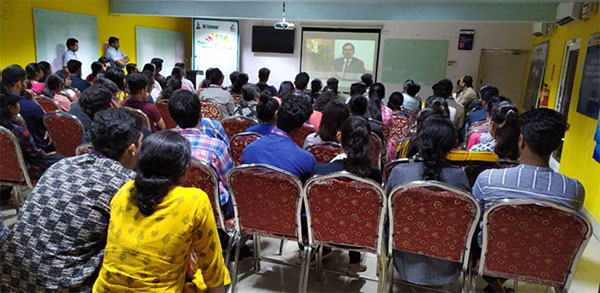
Research Poster Presentation
Department of Commerce PG organized "Research Poster Presentation" on 13th August, 2019 at Main Audi (UG Block) from 11 am to 4.30 pm. Total 77 research posters in various functional domains of commerce & business presented by III Semester M.Com & M.Com FA Students.
A research poster presentation with an academic or professional focus is the presentation of research information and findings by the researchers in the form of posters to the spectators. Research posters are widely used in the academic community and to summarize the research information and findings concisely and attractively.
The poster is usually a mixture of a brief text mixed with tables, graphs, pictures, and other presentation formats. At the event, the researcher stands by the poster display while other participants can come and view the presentation and interact with the author for any research discussion.
Total 120 students and few faculty members viewed research posters presented by III Semester M.Com & M.Com FA Students. The viewers had an interaction with presenters on the major thrust areas of research such as the research gap, objectives of the research, methodology used in the research, the tools & techniques applied in the research and conclusion of the research. The participants have felt that this flagship event provided them a forum and platform for exchanging their research thoughts and ideas with the spectators.
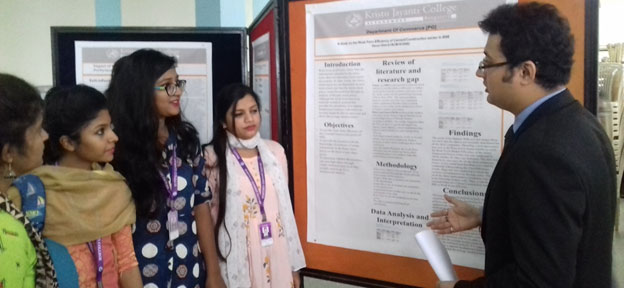
Life Skills Education
The Center for Life Skills Education in collaboration with Department of Commerce PG organized Capacity Building Training on Life Skills for I Semester M.Com, M.Com FA & M.Com FA with CIMA from 26th July to 29th July, 2019 in Administrative Block, Kristu Jayanti College (Autonomous), Bengaluru.
Three days life skill education for the I Year M.Com and M.Com FA Students of our college was started with introduction to Life skill Education on 26th July, 2019 at 09.30 AM in the Mini Auditorium of PG Block. Dr.A.Jonas Richard, Director, Life Skills Education, explained the importance of life skills education in the personal and professional life of an individual.
In a constantly changing environment, having life skills is an essential part of being able to meet the challenges of everyday life. The students would learn the nuances of life skills education which will help them in the pursuit of happy life in the personal and professional environment. The students were exposed to the following life skills education.
Critical Thinking
Creative Thinking
Self-Awareness
Empathy
Effective Communication
Inter Personal Relationship
Coping with Emotions
Stress Management
Problem Solving
Decision Making
Total 98 students (59 from I M.Com & 39 from I M.Com FA) attended Life Skills Education. The participants had an interactive experience with the life skills trainers and learned the significance of life skills education to lead a happy life.
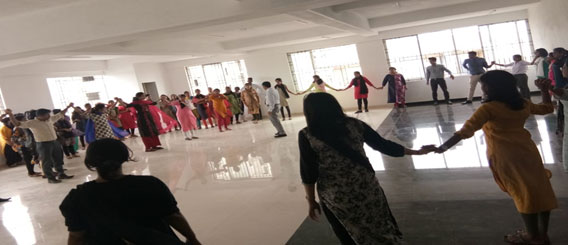
Value Education: Choices We Need to Make in Life Begins at PU Level
Ms. Konyn Tuba Lappay, III Semester M.Com, Department of Commerce PG delivered a lecture on “Value Education: Choices We Need to Make in Life Begins at PU Level” at St. Mary’s P.U College from 10 am to 12 pm on 1st July, 2019.
The main objective of this session was enable P.U students to decide on career opportunities available after 12th and how they can make themselves equipped to this volatile, uncertain, complex and ambiguous world where they don’t have to run for success but in fact strive for excellence and success is guaranteed. She spoke about 5 principles to be excellent in this modern era.
There were about 40 students from different streams like commerce, arts and science actively attended the session. The students have said that the session was fruitful and equipped them to flourish in the volatile, uncertain, complex and ambiguous world.
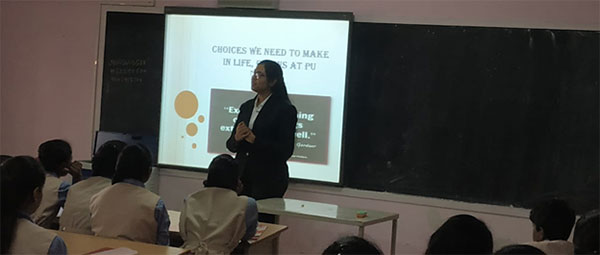
Samshodhan – A students’ Research Report Contest
Objectives of the Samshodhan
- To introduce and enhance the research culture in post graduate studies
- To enable to student to realize the importance of commerce related research report
- Students could be able to select the project title in the final semester of Post Graduate studies and also students have confidence and clarity in selecting their areas of studies for research report as part of their syllabus.
- The students could be able use statistical tools for their research study and accomplish their project report.
Students in post graduate level are below the par in research skill. Hence there must be an adequate encouragement for research activities at Post graduate level at the early stage of their post graduate studies. So that students could complete their project report in schedule time during final year of their studies with adequate knowledge in the areas of research.The students of second semester M.Com,M.Com(FA), are encouraged to select topic on paper presentation during their research methodology course, with guidance by a course teacher and students are encouraged to present their research design as part of preliminary stage of the contest which will be held in the first week of second month in the semester and this preliminary stage contest will be judged by any faculty members from commerce and management department other than the course teacher and suggestions for changes, feedback will be discussed in the department meeting and suggest measures for it. Final round will be conducted during last week of the second semester, where students will be given opportunity to present their research work on the stage and will be judged by group of judges from the Post graduate department commerce and management.
Paper Presentations and Publications
Objectives
• To introduce and enhance the research culture in post graduate studies
• To enable to student to have research exposure by participating in National and International conference in other colleges
The students of Final year and First year M.Com and M.Com(FA) will be encouraged to select topic on paper presentation and publication,with guidance by a teachers and students are encouraged to present their paper internally before presenting externally and any modification required will be made by the students with the guidance of teachers. The Students of Final year MCom And MCom(FA) have presented more than 200 papers in various National and International conferences conducted by different institutions and universities.
C.A.R Series (Communication, Aptitude and Research Series)
The department of commerce (PG) has for the first time initiated a unique blend of knowledge enhancing session for the students this semester which is called as the C.A.R Series. The main objective of the session is to build confidence in the students , improve their logical reasoning and quench their knowledge thirst. The students are engaged throughout the week twice during the 2nd hour of the week day. Every student is given the chance to conduct these sessions.
I. Communication: Being able to communicate effectively is the most important of all life skills. Communication is simply the act of transferring information from one place to another, whether this be vocally (using voice), written (using printed or digital media such as books, magazines, websites or emails), visually (using logos, maps, charts or graphs) or non-verbally (using body language, gestures and the tone and pitch of voice). Some of the communication skills one should possess are: Listening. Being a good listener is one of the best ways to be a good communicator. ...Nonverbal Communication. Your body language, eye contact, hand gestures, and tone all color the message you are trying to convey. ...Clarity and Concision. ...Friendliness. ...Confidence. ...Empathy. ..Open-Mindedness. ...Respect.
The communication club activity is conducted on Monday and Thursday of the very week.
II. Aptitude: Skills are the expertise or talent to do a job or task. Job skills allow you to do a particular job and life skills are what are needed for everyday life. Acquired or natural ability (usually measurable with aptitude tests), for learning and proficiency in a specific area or discipline. Aptitude is expressed in interest, and is reflected in current performance which is expected to improve over time with training.
During this hour, the class of M.com 1st Semester is engaged in doing the problems in the class. Students go through various problems and works on it. This happens twice every week, Tuesday and Friday .All the students are supposed to be engaged in the class during the hours and we strictly adhere to it. It’s an activity where in students learn a lot about how to analyze various problems by doing various problems that includes logical reasoning, mathematical problems, quantitative aptitude.
III Research: Research is basically an attitude of inquiry and an attempt to elicit facts. During this hour, the class of M.com 1st Semester is engaged in doing research in the library. Students read through various journals of their interests and write a report on it. This happens twice every week, Wednesday and Saturday .All the students are supposed to be engaged in research activity during the hours and we strictly adhere to it. It’s an activity where in students learn a lot about how to analyze various aspects by reading various journals provided from the library by focusing only on Commerce and Management topics.
Rural Exposure
The Department of Commerce (PG) is organising the two days rural exposure programme to the final year M.Com and M.Com FA students. The rural visits aim at making students aware of the rural realities. It gives an opportunity for students to witness and interact with different stakeholders regarding rural issues, urban developmental issues, educational support programmes, Child Nutrition and Health Care, land development activities, waste management etc.

